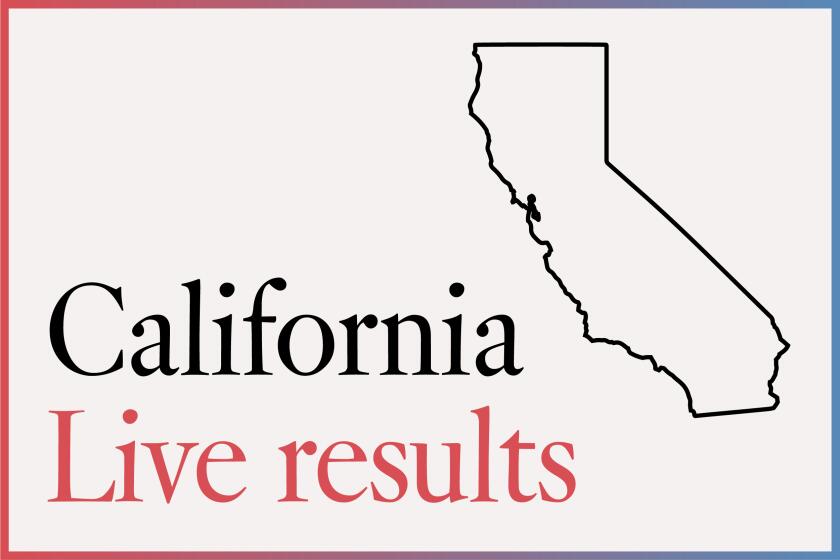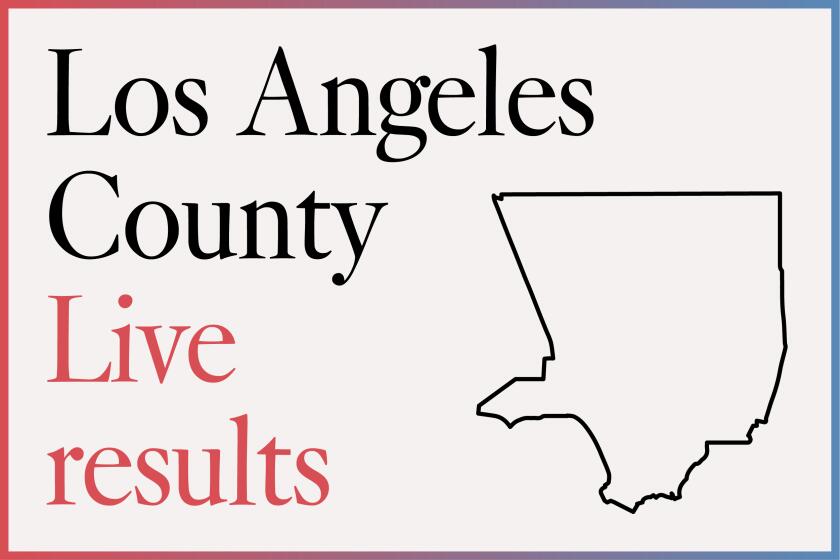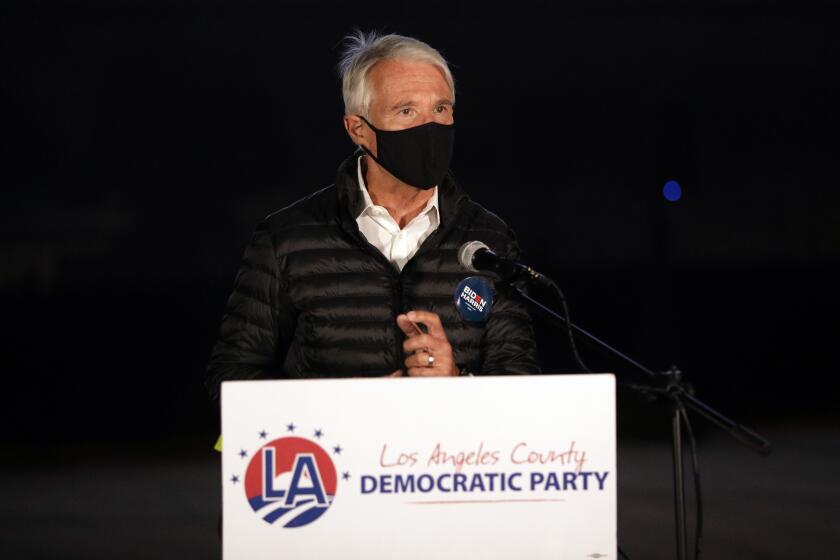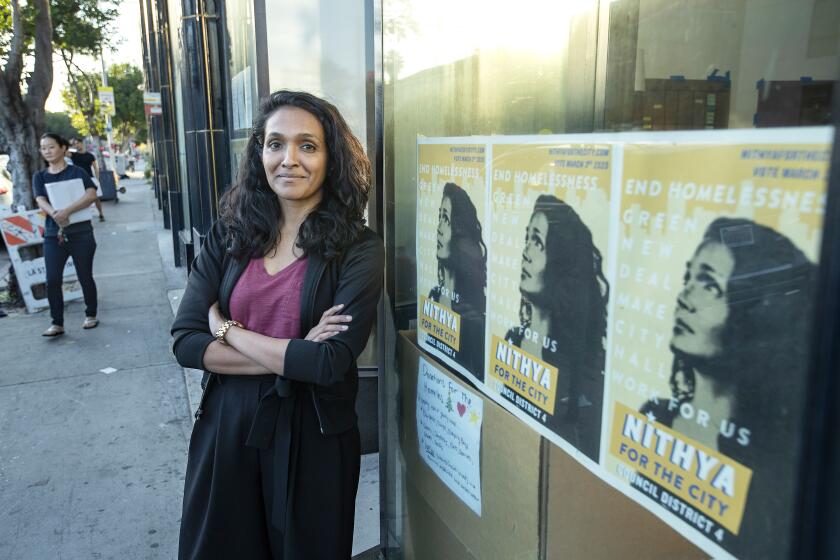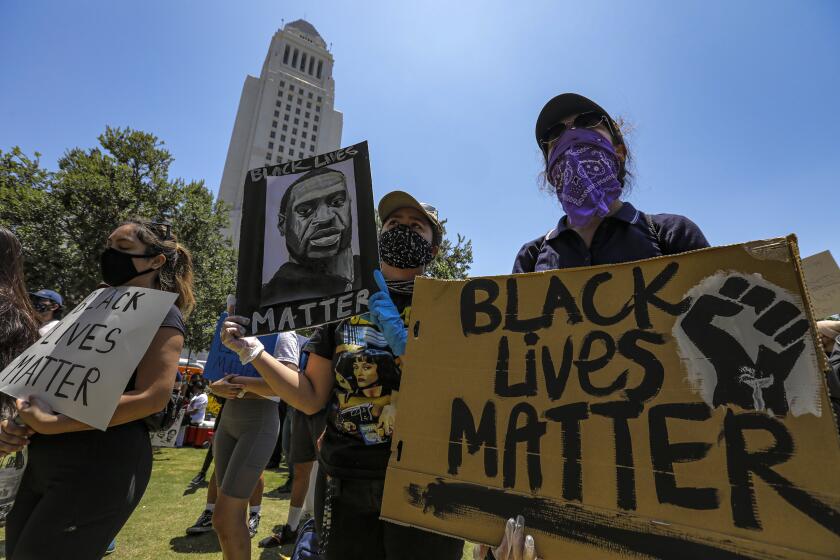California goes big on criminal justice reform, setting a more progressive path
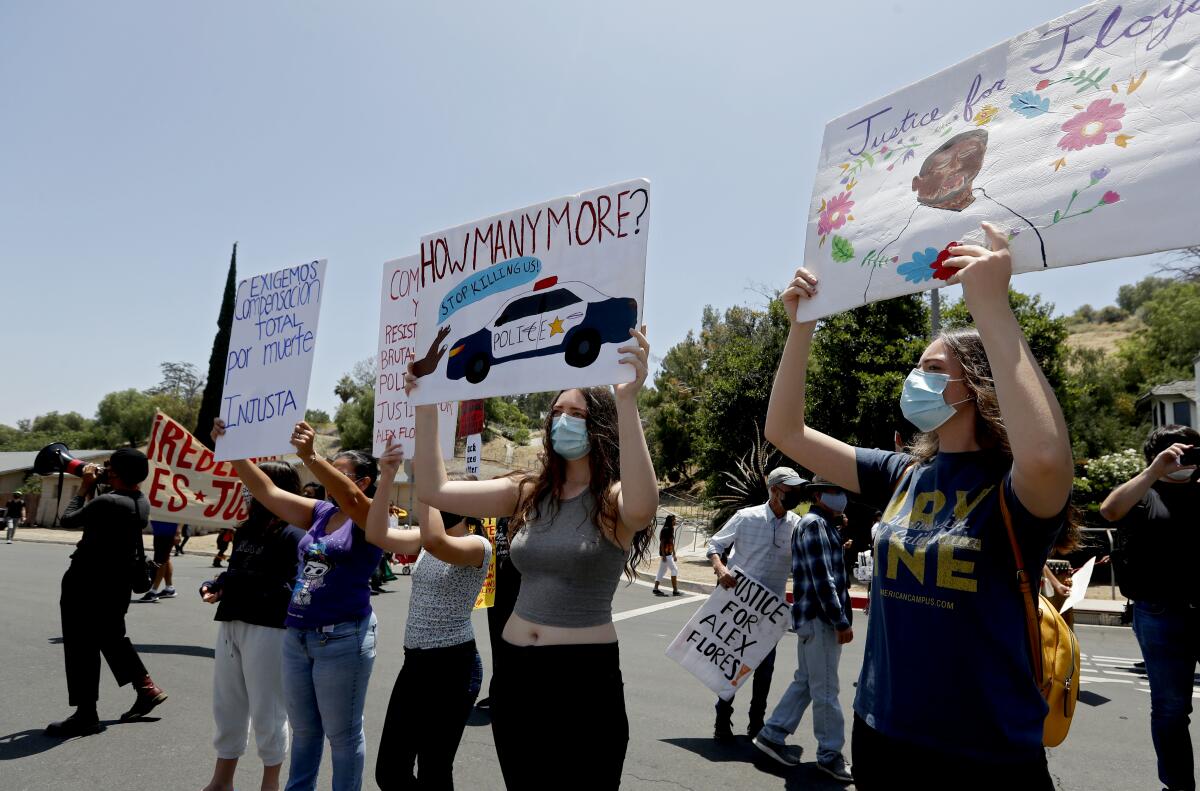
- Share via
California voters expressed a clear appetite for criminal justice reform on election night, supporting a series of ambitious changes after a summer of mass protests sparked a painful reckoning around racial injustice and debate over the role of policing.
Results throughout the state have not been finalized. But on statewide ballot measures and in key local races, voters backed progressive candidates and policies that promised to hold police more accountable and shift taxpayer funding away from law enforcement and toward social services.
In some cases, voters leapfrogged their own elected officials in the state Legislature to enact policies that never gained traction or fell short of passage during recent legislative sessions in Sacramento — where the idea of broad, statewide policing reform has loomed large but never fully materialized.
California has been a leader on easing the tough-on-crime tactics of an earlier era, but the results of Tuesday’s balloting opens a new front for more aggressive reforms, such as calls to reduce funding to law enforcement agencies.
Well-funded police unions and other groups, who were able stall police reform legislation in Sacramento, were less effective convincing voters the move would endanger public safety. But it also comes in a year in which crime — particularly homicides — are rising significantly in some cities, including Los Angeles.
“There was a time in California where the impulse was to incarcerate more people, three strikes and you are out,” Erwin Chemerinsky, dean of the UC Berkeley School of Law, said of the election results Wednesday. “I don’t think that is the impulse in California any longer.”
In Los Angeles County — one of the nation’s largest criminal jurisdictions and a longtime trendsetter in criminal justice issues — voters appeared to have ousted Dist. Atty. Jackie Lacey, who was accused by her critics of being too lenient on cops and too cozy with police unions, and passed a measure mandating that county officials spend more on jail diversion programs, mental health and housing.
In San Francisco, voters approved measures that will ramp up oversight of the local sheriff and undo a requirement that the city‘s Police Department maintain a certain size — a rule that some had seen as a barrier to defunding the department more broadly.
At the state level, voters restored the right to vote to parolees, and rejected a measure that would have increased penalties for petty offenses.
Advocates said the reforms are substantial, but do not solve all the issues they see with the criminal justice system. Still, decisions voters made this week will reshape how services are accessed by homeless people and those released from prison, and how police shootings are investigated and assessed for criminality by prosecutors.
They also suggest support among the broader electorate for reimagining public safety and shifting responsibilities and funding away from police, a process already being contemplated in L.A., where the Los Angeles Police Department’s budget was cut by $150 million earlier this year.
The shift — following a summer of protests over police brutality against Black and brown people — is one that police unions had spent heavily in campaign contributions to halt, and one activist groups on Wednesday claimed as a major victory after years of effort.
Activists felt particularly encouraged by the apparent fall of Lacey, whom they have protested and rallied against for years for her refusal to prosecute police officers in a number of controversial shootings of unarmed men.
Although results were not finalized Wednesday, Lacey’s challenger, George Gascón, seemed poised to win, which Black Lives Matter Los Angeles’ Baba Akili called “a testament to the power of consistent collective action.”
A general election redefined by a summer of protests against police brutality and racial injustice, coupled with a nationwide turnout surge among progressives, could propel Gascón into office.
The group rallied in celebration of Lacey’s apparent loss in downtown L.A. on Wednesday afternoon, and suggested a Gascón victory could reshape the way prosecutions are handled in an office that files well over 100,000 criminal cases each year.
“Los Angeles County is winning and we owe it all to organizers,” said Patrisse Cullors, co-founder of the Black Lives Matter movement.
Gascón has promised to expand the use of pretrial diversion programs and alternative sentencing courts in L.A. County, methods Lacey faced criticism for not using enough, and reopen investigations into a number of past shootings by police officers.
A Gascón victory would be the biggest win yet in a nationwide push to elect more progressive prosecutors, and Chemerinsky said it was one of the more significant criminal justice wins of the election, reflective of a broad desire to continue reforms.
Gascón’s message, and that of the reform activists, seemed to resonate with voters.
Four years ago, Los Feliz resident Willie Mack, 43, voted for Lacey and for City Councilman David Ryu. This year, he changed course on both candidates, voting for Gascón after learning more about Lacey’s record and her support from police unions, and voting for Ryu’s challenger, Nithya Raman, in part because of her position that the LAPD was overfunded.
Raman, an urban planner who looked on course Wednesday to represent the city’s Silver Lake-to-Sherman Oaks district, had argued in favor of making the LAPD a “much smaller, specialized armed force,” removing officers from traffic enforcement and vehicle collision duties.
A ‘political earthquake’ hits City Hall as Nithya Raman’s strong showing in council race propels a leftward push in L.A.
Of his vote for Gascón, Mack said there “needs to be a line between cops and the people required to hold them accountable.” Of his vote for Raman, he said, “We need fresh blood.”
The board of the Los Angeles Police Protective League, which represents rank-and-file LAPD officers and backed Lacey, said Wednesday that it joins “other Angelenos in praying that [Gascón] does not do for our city what he did to San Francisco,” which it said was “overrun by a mental health crisis and open-air drug markets” when Gascón was that city’s top prosecutor from 2011 to 2019.
Voters also backed the passage of Measure J, which will require L.A. County to spend hundreds of millions of dollars on social services while precluding certain funding from being spent on prisons, jails or law enforcement. Eunisses Hernandez, co-chair of the Yes on Measure J campaign, called its passage “a true step in changing structures” that have long prevented communities of color from being prioritized.
Los Angeles County voters have approved Measure J, which will divert more county money to social services and jail diversion programs.
At the state level, voters stood firmly behind past measures to limit punishments for petty crimes and lower prison incarceration rates by rejecting Proposition 20, a measure that would have toughened sentencing for certain crimes. Although backers of the proposition said those earlier efforts had increased crime and left low-level offenders unpunished for repeat offenses, more than 60% of voters rejected that argument — including many in conservative counties such as San Bernardino, Placer and Kern.
Jay Jordan, executive director for Californians for Safety & Justice, which championed many of the reforms Proposition 20 was aimed at repealing, said its defeat showed that Californians across the political spectrum no longer view incarceration as an answer to social problems.
“No one agrees with criminalizing homelessness and addiction,” Jordan said. “No one agrees with overincarceration.”
Reform advocates did not sweep up victories on every measure they backed. One, Proposition 25, which would have eliminated most cash bail in the state, was rejected by voters.
Cash bail has become a national goal of criminal justice reformers, but the 2018 California bill to ban it — which Proposition 25 was a referendum on — ended up dividing advocacy groups, some of whom feared that language added to the bill during final legislative negotiations would have extended pretrial jail stays and increased racial bias.
On Tuesday, some observers said that voters were confused on the proposition. Still, they feel confident that cash bail has a limited future in the state, with the state Supreme Court and federal courts set to address the issue in pending cases.
However, some cautioned that with a pandemic still unchecked, continued criminal justice reform is not guaranteed.
According to a poll this summer by UC Berkeley’s Institute of Governmental Studies, many Californians support police reform but also the police. That support varies geographically in the state, as well as among people of different races and political affiliations. Reforms palatable in some areas of California are not popular in others.
Magnus Lofstrom, policy director for criminal justice at the Public Policy Institute of California, said past reform efforts have been fueled in large part by the desire to lower incarceration rates, and the urgency may abate as officials drive the state’s prison and jail populations down to levels not seen since the 1990s in an effort to halt the spread of COVID-19.
“Where that takes us now is very difficult to say,” he said.
Times staff writers Jaclyn Cosgrove, David Zahniser and Laura Zornosa contributed to this report
More to Read
Sign up for Essential California
The most important California stories and recommendations in your inbox every morning.
You may occasionally receive promotional content from the Los Angeles Times.
